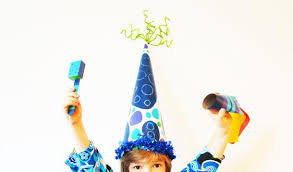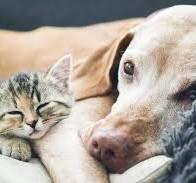New Years can be fun for people – get togethers, spirits, food and fireworks! Great for us, yes. For our cat and dog companions, often less so. Many dogs and cats get anxious around loud groups of people. If your pet is slightly shy, it’s important they have a place to go and escape the festivities.
For dogs this may mean another room they can enter. For cats it may mean a room or rooms along with safe places to hide. Cardboard boxes, cat trees with hideaway cut outs can all be very helpful.
1-2 days before the holiday have Adaptil (for dogs) and Feliway (for cats) diffusers plugged in around your home. These are calming pheromones which really do help and lessen anxiety.
Noise


Make sure your doors and windows are closed so your four-legged friends can’t run and accidently get out if they are scared. For both cats and dogs, loud noises such as fireworks can be very frightening. Your veterinarian can help by evaluating your pet and listening to you report how they responded on previous occasions. there are calming drugs that can be given to both species if anxiety is a concern.
Fatty Foods and Toxins

Skip the Sweets: Most owners know that chocolate is bad for pets. But the artificial sweetener xylitol can also cause severe side effects. Pets may go to extraordinary lengths to put tasty things in their mouths and swallow. In addition, fatty foods (or regular people food) can cause intestinal upset as well as pancreatic inflammation, called pancreatitis.
Keep pets away from your table: Fatty, spicy and no-no human foods, as well as bones, should not be fed to your furry friends. Pets can join the festivities in other fun ways that won’t lead to costly medical bills.
Leave the Leftovers: Fatty, spicy and no-no human foods, as well as bones, should not be fed to your furry friends. Pets can join the festivities in other fun ways that won’t lead to costly medical bills.
Careful with Cocktails: If your celebration includes adult holiday beverages, make sure unattended alcoholic drinks are placed where pets cannot get to them. If ingested, your pet could become weak, ill and may even go into a coma, possibly resulting in death from respiratory failure. Emergency treatment is needed!

Pet-friendly stocking stuffers: Looking to stuff your pet’s stockings? Stick with chew toys that are basically indestructible, Kongs that can be stuffed with healthy foods or chew treats that are designed to be safely digestible. Long, stringy things are a feline’s dream, but the most risky toys for cats involve ribbon, yarn and loose little parts that can get stuck in the intestines, often necessitating surgery. Surprise kitty with a new ball that’s too big to swallow, a stuffed catnip toy or the interactive cat dancer.
Lilies: A common pretty flower found in many holiday arrangements. This flower is highly toxic to cats and can cause life-threatening kidney failure if ingested
Summary for Planning a Pet-Safe Gathering
- House Rules: If your animal-loving guests would like to give your pets a little extra attention and exercise while you’re busy tending to the party, ask them to feel free to start a nice play or petting session.
- Put the Meds Away: Make sure all of your medications are locked behind secure doors, and be sure to tell your guests to keep their meds zipped up and packed away, too.
- A Room of Their Own: Give your pet their own quiet space to retreat to—complete with fresh water and a place to snuggle. Shy pups and cats might want to hide out under a piece of furniture, in their carrying case or in a separate room away from the hubbub.
- New Year’s Noise: As you count down to the new year, please keep in mind that strings of thrown confetti can get lodged in a cat’s intestines, if ingested, perhaps necessitating surgery. Noisy poppers can terrify pets and cause possible damage to sensitive ears. And remember that many pets are also scared of fireworks, so be sure to secure them in a safe, escape-proof area as midnight approaches.
Be Prepared

Your animal may become poisoned in spite of your best efforts to prevent it. You should keep telephone numbers for your veterinarian, a local emergency veterinary service, and the ASPCA Animal Poison Control Center 1-888-4ANI-HELP (1-888-426-4435, for a fee) in a convenient location. If you suspect that your pet has ingested something poisonous, seek medical attention immediately.

With thought and attention into planning your party, you can ring in the New Year in a way that’s fun for you, your family and friends and still keep your pets calm and safe. If you have questions, reach our to your family veterinarian for a consultation before the New Year arrives!


